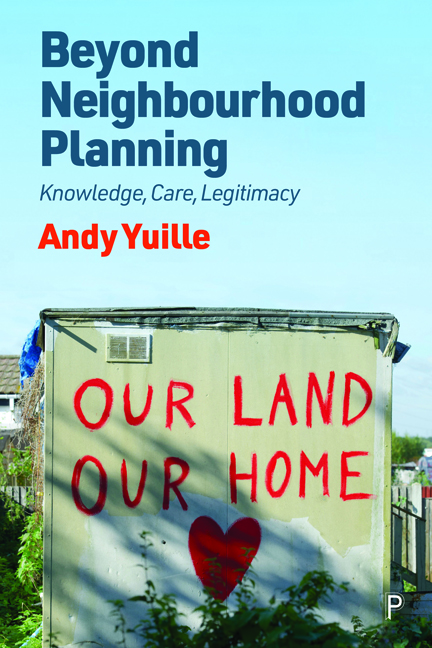Book contents
- Frontmatter
- Contents
- List of figures and table
- Acknowledgements
- Preface
- 1 Introduction: Neighbourhood planners and the turn to participation
- 2 Planning, participation and democratisation
- 3 Knowledge, politics and care: perspectives from Science and Technology Studies
- 4 Neighbourhoods, identity and legitimacy
- 5 Experience, evidence and examination
- 6 Expertise, agency and power
- 7 Care and concern
- 8 Conclusion: Neighbourhood planning and beyond
- Notes
- References
- Index
8 - Conclusion: Neighbourhood planning and beyond
Published online by Cambridge University Press: 20 January 2024
- Frontmatter
- Contents
- List of figures and table
- Acknowledgements
- Preface
- 1 Introduction: Neighbourhood planners and the turn to participation
- 2 Planning, participation and democratisation
- 3 Knowledge, politics and care: perspectives from Science and Technology Studies
- 4 Neighbourhoods, identity and legitimacy
- 5 Experience, evidence and examination
- 6 Expertise, agency and power
- 7 Care and concern
- 8 Conclusion: Neighbourhood planning and beyond
- Notes
- References
- Index
Summary
We ignore at our peril the anger and disaffection felt by so many communities at the failure of current planning policies and procedures to listen to their concerns and respond to their needs. Restoring public confidence in the planning system is one of our generation's greatest challenges.
Raynsford (2018)In this chapter I summarise the arguments made in the previous chapters, and then go on to discuss some of the practical and theoretical implications of those arguments.
Cat's cradle: weaving the threads together
Planning is supposed to be an inclusive arena that engages a wide range of stakeholders, knowledges and ways of knowing. Yet it has consistently been perceived by communities as exclusionary and inaccessible. The decades of reforms intended to address this problem are, on the whole, perceived to have failed, as demonstrated by each successive set of reforms intended to yet again promote inclusivity in the face of a system that militates against it, and as the opening quotation from Nick Raynsford bears witness to. Raynsford was a former housing and planning minister, commissioned to conduct an independent, root-and-branch review of the English planning system on behalf of the Town and Country Planning Association, which reported in 2018 (Raynsford et al, 2018). This quotation was taken from his remarks on launching the findings of his report, and highlights the ever-more urgent need to address this issue.
The challenge highlighted by Raynsford remains so intractable at least partly because the knowledge and ways of knowing that citizens bring to planning, in particular their cares and concerns based on lived experience, are not able to be meaningfully heard in planning institutions. They tend to be expressed by citizens and understood by planners as knowledgevalue hybrids that emerge from the phenomenological experience of ‘emplacement’ – of lived and practical entangled engagement in and with place. In contrast, through all its reforms the planning system has only been
- Type
- Chapter
- Information
- Beyond Neighbourhood PlanningKnowledge, Care, Legitimacy, pp. 231 - 249Publisher: Bristol University PressPrint publication year: 2023

